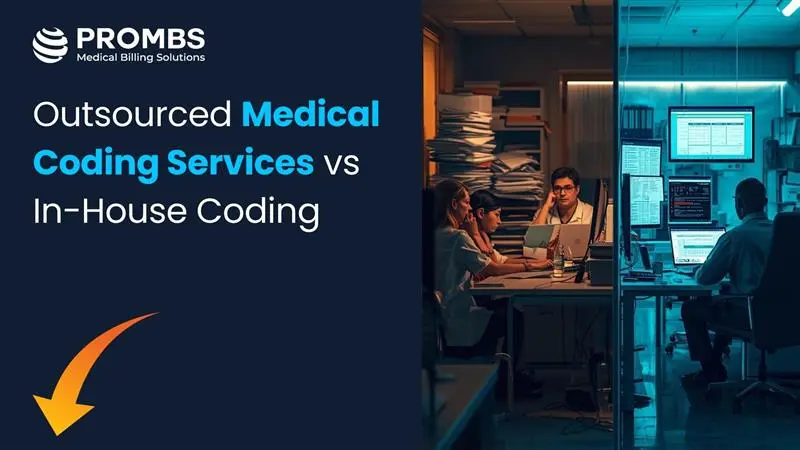Introduction
Medical Billing and Coding are important components of the healthcare industry. Medical billers and coders have a substantial role and are significant participants in this industry. They streamline the whole billing process. Healthcare providers would not be reimbursed for the services they provide had there been no medical billers and coders. They have the expertise to make the whole administrative and financial process of a healthcare facility transparent, leading to operational efficiency and economic stability. In this blog, we will discuss what a Medical Biller and Coder do and other important queries, such as what they do and how they can bring about potential stability and ensure uninterrupted workflow for a healthcare facility.What Does a Medical Biller and Coder Do?
Medical billers and coders are important players in the healthcare industry. They play an important role in optimizing the whole billing and coding process. Here we explain the major reasons why they are essential for the stability of a healthcare facility. According to the report published by the Bureau of Labor Statistics ( BLS), the employment of health information technicians and medical records (which includes billers and coders) is expected to grow 8% from 2019 to 2029. This exponential growth is due to a few reasons such as the aging population and the increasing need for healthcare services. Medical Billers perform multiple RCM procedures in healthcare facilities such as prior authorizations, patient registration, benefits verification, charge input, denial management, payment posting, resolving rejections, and account receivable administration.Why is Medical Coding Important?
Medical coders play an important role in obtaining medical reports from healthcare providers that provide them with critical information for the medical claim such as the patient’s health condition, diagnosis, and prescription. The primary responsibility of a medical coder is to ensure that all billing and coding data is accurate. There is no denying the fact that there is a difference between billing and coding professionals in terms of job description, designations, and titles but their billing and coding bills are closely intertwined and are therefore interdependent.What Does a Coder Do?
What does Medical Coder do and what does Medical Billing and Coding do? A medical coder’s main job is to ensure medical diagnoses and procedures are effectively translated into universally recognized codes. These codes are specifically used for insurance and billing purposes and are recognized by companies such as Medicaid, and Medicare. Medical coders must ensure that all codes are compliant with all legal and regulatory requirements. The role of billers in Medical Billing and Coding that they do in the healthcare industry is because of the excessive importance of medical coding.Following are the responsibilities that medical coders need to perform at a healthcare facility.
- Reviewing patient records containing diagnoses, medications, and doctor notes.
- Making a note of the details of the history of each patient, using CPT code books and ICD-10, assigning medical codes to this data.
- Adding this data to the database (which is used frequently for record storage and/or billing).
- Ensuring that the documents containing details of the medical records of the patient are kept private and secure.
- Periodically checking documents to make sure that codes are accurate and compliant.
- Helping with billing procedures which include mailing insurance companies coding papers.
What Does a Medical Biller Do?
Medical billers have a largely important role in uplifting the revenue growth of a healthcare facility. Medical billers submit insurance claims and ensure that providers are reimbursed for their services. They collaborate with medical coders to ensure that all claims are compliant and accurate with legal and regulatory requirements. Here we explain what a medical biller does, what is Medical Billing and coding and how they explore growth avenues for a healthcare facility. What do Medical Billers do? On an average day, they might perform the following tasks:- Using medical coder’s diagnosis and treatment to create and submit reimbursement claims.
- Verifying claims and codes to ensure they are correct and reflect the caliber of treatment provided.
- Communicating with coders, providers, and insurance providers to resolve any difference or dispute.
- Collaborating with patients to obtain payment if patient’s insurance or other payers failed to cover their expenses.
- Pre-authorization for procedures or treatments can be obtained by speaking with healthcare providers and insurance providers as necessary.
Guidelines for Medical Coders and Billers
If you are looking to establish your life-long career in the field of Medical Billing and Coding, you must understand medical terminology, physiology, and anatomy to accurately translate medical services into codes. You need to be familiar with the latest medical technologies such as telehealth, electronic health records, and advancements in the industry. This is important to understand, given the huge financial stakes of the provider involved in the process as wrong codes can deny him reimbursement for his services, leading to financial instability of the healthcare practice.Stay up-to-date with Changes
It is also imperative for medical coders to stay updated with the latest changes in medical terminology, codes, and procedures. Codes frequently evolve due to the updates in medical advancement and technology. Medical coders must be in a position to accurately use and identify the latest codes to ensure that providers are reimbursed for their services.Accurate Documentation
Medical coders work in close collaboration with healthcare providers to ensure that all Medical Billing services are accurately documented and appropriately coded. They must possess extraordinary communication skills to effortlessly convey their point to the provider to ensure that all benefits are accurately recorded and that any coding discrepancies are promptly resolved. Keeping in view the above discussion, the billing and coding responsibilities of billers and coders have an essential role in accurate billing and reimbursement in the healthcare industry. They ensure compliance with regulatory and legal requirements, protect patient confidentiality and privacy, and maintain financial stability. The role of medical billers and coders will remain largely crucial in the healthcare industry in the future with projected growth in employment.FAQs
What does medical coding do?Medical coding translates healthcare diagnoses, procedures, and services into standardized codes for billing and insurance purposes. What do medical billing and coding do? A Medical Billing and Coding professional ensures healthcare providers are accurately reimbursed by assigning correct codes and processing insurance claims.
What does a medical biller coder do?A Medical Biller and Coder are responsible for translating healthcare services into standardized codes for billing and insurance claims. They ensure accurate medical records, process payments and work with insurance companies to facilitate reimbursements for healthcare providers.
What are the duties of a medical biller and coder?A Medical Biller and Coder assigns standardized codes to medical diagnoses and procedures for insurance claims. They ensure accurate billing, submit claims, follow up on denials, and maintain patient records. Their role ensures proper reimbursement and compliance with healthcare regulations.
What is the key difference, and how do their roles work together in healthcare administration?A medical coder translates diagnoses and procedures into standardized codes (ICD-10, CPT, HCPCS) for billing, while a medical biller uses these codes to submit insurance claims and process payments. Both roles ensure accurate reimbursement, compliance, and revenue cycle efficiency in healthcare administration.
What is the definition of medical coding and billing?Medical coding and billing is the process of translating healthcare diagnoses, procedures, and services into standardized codes for insurance claims and reimbursement. It ensures accurate billing and compliance with healthcare regulations.
What is the Medical Billing and coding definition?Medical billing and coding definition refers to the process of translating healthcare services into standardized codes for insurance claims and reimbursement. It ensures accurate billing, streamlines revenue cycle management, and maintains compliance with industry regulations like HIPAA, CPT, ICD-10, and HCPCS.
What makes a medical biller and coder from Pro Medical Billing Solutions exceptional?A medical biller and coder from Pro Medical Billing Solutions excels in accurate coding, seamless claim processing, and maximizing reimbursements. With expertise in ICD-10, CPT, and HCPCS, they ensure error-free billing, quick claim approvals, and full regulatory compliance, delivering top-tier revenue cycle management for healthcare providers.



